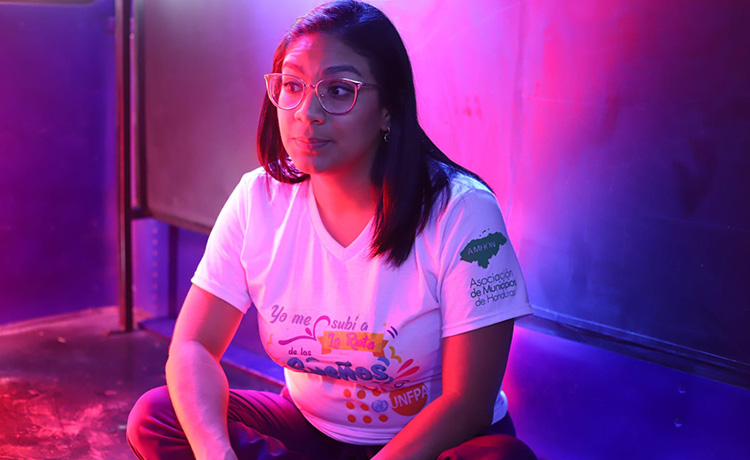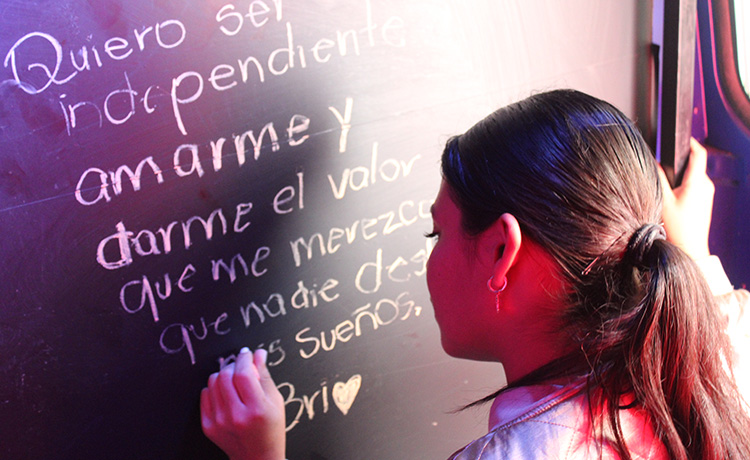News
“I must continue fighting to keep her in school”: Following the Ruta de los Sueños bus to prevent teen pregnancy across Honduras
- 02 February 2024
News
TEGUCIGALPA, Honduras – “I want to be a doctor.” “I want to be an engineer.” “I want to be an artist.” These are just a few of more than 5,000 dreams that teenagers have shared on the Ruta de los Sueños bus.
The bus is an educational initiative supported by UNFPA, the United Nations sexual and reproductive health agency, loosely translated as the ‘Route of Dreams’. It travels across the country to the most remote communities, with a psychologist aboard offering comprehensive sexuality education to teenagers to help avoid unintended pregnancies and support survivors of gender-based violence.
In Honduras, around two thirds of survivors of gender-based violence are under 18, with teenagers between 13 and 17 reporting some 40 per cent of cases. And one in four girls give birth before they turn 19, making it the country with the second highest adolescent pregnancy rate in Latin America.
Aboard the bus, girls and boys from age 10 to 19 can find information, guidance, counselling, sexual and reproductive health information, psychological support and advice on contraception. The programme is run together with health-care specialists, social workers and youth activists at adolescent-friendly facilities in more than 50 towns across the country.
So far, the project has reached over 5,000 children in various departments of Honduras, even in the most remote and disadvantaged communities. These areas are often impoverished, underserved in both health facilities and information, and many lack a consistent electricity supply; the bus has its own power and Internet connection, so staff can continue giving lessons even in the hardest-to-reach places.

New tech for life lessons
The team came up with fresh ideas to spur young people to make informed and responsible decisions for their mental as well as physical well-being: Using virtual reality, for example, they invented a love story between two teenagers that shows them dealing with typical issues facing adolescents in Honduras, including gender-based violence.
“I will never forget it,” said Carlos*, a 13-year-old from San Juan Intibucá in Honduras’ western highlands. “I had never seen virtual reality before, it was really exciting!”
It’s a creative approach that proved to be a lesson in gender equality as well. “The bus has taught me to respect girls,” said 16-year-old Luis* in Tegucigalpa. He had heard about the project at a local NGO, Casa Alianza, which provides shelter for homeless and vulnerable young people and had requested a visit from the Route of Dreams bus.

Launched only in 2022, the initiative has already proved popular. “We arrived at the town of Florida Copán, and the mayor was waiting for us with 900 girls,” said Noelia Blanco, a psychologist at the Association of Municipalities of Honduras and the main facilitator on the bus.
“Getting all the girls on the bus was a lot of work, but we are happy because we could share our pregnancy prevention message.”
Prioritizing dreams and goals
The students are also encouraged not to forget the importance of their personal life projects, with one of the activities being to ask adolescents to write down their dreams and commit to achieving them in the future.
“Thank you for coming to our town,” said one single mother of five in Concepción del Sur, in the Santa Bárbara department. “I was even thinking about taking my daughter out of school as I could barely afford it, but this experience tells me that I must continue fighting to keep her in school.”
The Ruta de los Sueños is coordinated by local authorities, including education and health institutes, local women’s and youth organizations, the Association of Municipalities of Honduras, and UNFPA, with financial support from Canada.
In addition to this initiative, UNFPA and the Public Ministry of Honduras have launched another all-terrain mobile unit that assists survivors of sexual violence across the country.
*Names changed for privacy and protection